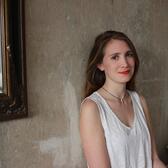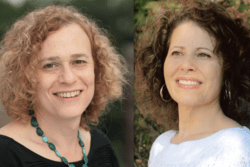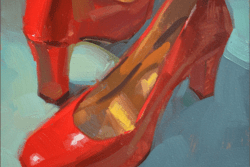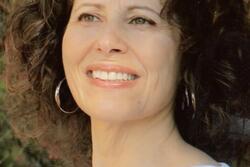The Lovely Lesléa Newman
Are there any boundaries that Lesléa Newman hasn’t broken? In 1989, she made headlines and history with the controversial Heather Has Two Mommies, a book that brought the LGBTQ experience to the children’s section of the bookstore. Over the past three decades, she has gone on to write books for both children and adults about LGBTQ rights, HIV/AIDS, Jewish identity, and more. This month, her latest poetry collection, Lovely, hits bookstores, and in it, she delves into themes of love, empathy, and the taboo topic of growing older as a woman in a youth––and beauty––obsessed society. I talked with Newman about these radical themes, as well as about the accessibility of poetry, fairytales, and, of course, Jewish hair.
Full disclosure: I’m not a regular poetry reader, and yet I found these poems quite accessible.
I’m really glad you find the book accessible, because that’s really important to me. A lot of people are turned off by poetry. I’m definitely on a mission to try to convince people that even if you don’t consider yourself someone who reads poetry, there is poetry out there, whether it’s mine or someone else’s, that’s accessible to anybody.
You engage with fairytales throughout your book. Why do you think fairytales are having a moment right now? Why do you think these stories endure?
It seems to me that incorporating imagery or stories that people are familiar with really helps the reader with the poem. By including fairytale references, you’re tapping into common knowledge. Already the reader is part of the story, and they can bring their associations to the poem. I think that tactic is really effective.
In terms of why fairytales and folktales are popular these days, I think we are all so desperate to make the world a better place. Sometimes I find myself reaching back to a time when I was more innocent, to a time when I didn’t have the weight of the world on my shoulders. I find that to be very comforting.
Many of your poems involve your relationship with your mother, a theme that I think almost all women can relate to.
Well, I wrote a book called I Carry My Mother that was published in 2015. That book was my way of dealing with her illness and death and my grief. Many of the poems were imitations of poetry by Emily Dickinson, Robert Frost, Dr. Seuss, various people. I really thought I was done writing about my mother and I was surprised when I started this book and I was still writing about her. The prose poem "Maidel" was influenced by the Jamaica Kincaid story Girl [in which Kincaid lists all the pieces of advice her mother gave her]. The voice in that is so strong––I thought, what if I wrote all the things my mother said to me?
Then there are some old anthologies that inspired me, such as Her Face In the Mirror: Jewish Women On Mothers and Daughters, edited by Faye Moskowitz. There are beautiful short stories and poetry in there; that’s a book that I return to time and time again.
Some of these poems deal with reinterpretation of memories from your childhood. How do you approach these memories? Are these events that you’ve mulled over for decades and slowly come to see in a new light?
[On the second poem in the book, "Home Safe"]. I had this memory of this situation when we were playing tag in the backyard and something happened between me and this boy. I never really forgot it. But my philosophy, whether you’re a writer or not, is that we’re all treasure chests of memories. Sometimes something will happen that will bring it to the front of your mind. When I start writing, I never know how the novel or poem or short story will end. What happened to me in that backyard was a disturbing moment, but because I’m an adult now, as I was reflecting on it, I had this aha moment that this little boy who had done something horrendous to me must have had something horrendous happen to him. At this point in my life, I look back with compassion, which I didn’t at the time.
I loved your poem about your lifelong relationship with your Jewish hair. This seems to be another perennial theme for Jewish women; the opening episode of Broad City this year attests to that, and JWA has explored it as well. What advice do you have for young Jewish women, or all young women, navigating fraught beauty standards in this world?
The most important thing is to love and accept yourself how you are. That’s easier said than done because of the culture and society we live in. I don’t think things have changed all that much since I was a young woman. There was a certain standard that was impossible to adhere to, especially for Jewish women. I didn’t really think about that at the time, though––that the standard was to be tall and thin and have blonde hair and a ski-slope nose. Some Jewish women fit that standard, but most don’t. It never occurred to me that that reeked of anti-Semitism. Dark curly hair and curvy bodies weren’t acceptable when I was growing up.
It’s important for young girls and women of any age to be honest with ourselves. If you really want to accept something but you’re not there yet, be kind to yourself. We’re all doing the best we can. And we need to support each other. That’s really important.
I loved your frank engagement with the perils and triumphs of growing older as a woman in a beauty-obsessed culture. Do you think it’s difficult for women to discuss?
I think it is. It comes with a certain degree of being self-conscious. As a young woman I looked a certain way, and as a woman in my sixties I look a different way. It’s a way that’s not appreciated, or rewarded, by our culture. I got a lot of rewards, some wanted and unwanted, as a young woman for the way I looked. That might sound conceited, but it’s the truth. To give that up--or to have that taken away, I should say--is something to be dealt with. My feelings are complicated, because I identify strongly as a feminist, so those things shouldn’t matter, but they do. It’s something I grapple with, and whenever I grapple with anything I put it in a poem.
You also write about love, but not the fireworks of brand-new love. Rather, you write about a comfortable and loving long-term relationship.
The love poems in Lovely are poems to the person I’ve been in love with for thirty years. A lot of people appreciate that you can be in a long-term relationship and still find it exciting and passionate enough to write poems about it. Many people write love poems when they’re first falling in love, at the beginning of a relationship, but I appreciate poems about long-term loves, because I think they’re so rare, and it’s different than the first flush of falling in love. You think you know everything about someone, but you don’t, even after so many years. You’re constantly finding out something new.
A major part of these poems seems to be empathy: empathy for strangers, empathy for dogs, empathy for everyone. Is empathy part of the project of writing fiction and poetry for you?
I’m really glad that this theme comes through. I feel, now more than ever, that it’s important to be kind. I think kindness comes from empathy. When you meet someone, when you glance at someone passing by, you don’t know their story. When I pass someone at the supermarket, they don’t know that my dad just died. Everyone has some sadness in their life. I’m glad that comes through in my writing. There’s a poem about a homeless person, a poem about the dogs who were hanged at Salem. I try to feel compassion and I try to direct my writing and life that way.








A truly LOVELY conversation. As a member of Leslea's weekly writing group, I have to tell you she is as wonderful and as engaged as her poems. You really do get what you see with her. And it is lovely.
Jane Yolen
In reply to A truly LOVELY conversation. by Jane Yolen
Thank you for this nice comment, Jane. We're fans of Leslea's ... and of yours, too! I hope you've found yourself on this site (jwa.org/people/yolen-jane and jwa.org/encyclopedia/article/Yolen-Jane). Your books have inspired all of us at JWA.